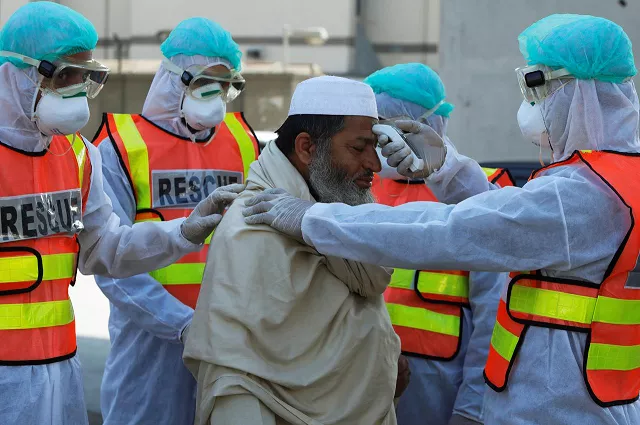Strengthened KTH rises to fight against Covid-19
Hospital has been playing a pivotal role since its inception to provide quality healthcare services
PESHAWAR: The Khyber Teaching Hospital (KTH), a leading public sector hospital in Peshawar, has been strengthened in terms of healthcare services, equipment, faculty and medicines to combat the novel coronavirusLocated opposite University of Peshawar on the historic route leading up to Khyber Pass, the hospital has been playing a pivotal role since its inception to provide quality healthcare services to patients of Khyber-Pakhtunkhwa and even from Afghanistan.
Dealing successfully with the emergencies of the devastating earthquake of 2005, 2010 floods, war against terrorism, dengue fever or the current coronavirus pandemic, the hospital has always rose to the occasion.
Over 2,000 patients sent to home-isolation in Rawalpindi
Established in 1976, the KTH has been strengthened due to the health reforms introduced by the incumbent PTI government under the Medical Teaching Institutions (MTI) Reforms Act 2015. The reforms have remained highly productive and their positive effects have become more visible now when the country was fighting against the prevailing pandemic.
Following promulgation of the MTI Act 2015, the hospital was providing health services 24/7 to deal emergency and routine cases besides providing medical care to the patients of coronavirus.
After the aforementioned Act, operation theaters are being used for 14 hours and teaching staff is now available on the premises of the hospital for minimum 14 hours due to Institutional Based Practice (IBP).
Prior to the act, KTH used to close in the afternoon with only emergency services running.
KTH Director, Dr Zafar Afridi said that 1,300 beds and 56 ventilators were available in the hospital against which 55 beds and 25 ventilators were reserved for Covid-19 patients.
He said every bed was connected with a central supply oxygen besides facilities of a portable ultrasound, digital X-rays and portable dialysis machines.
According to official documents, as many as 2,359,475 patients were examined at the hospital’s Out Patient Department (OPD) and 2,150,488 at the Accident and Emergency Department (A&ED) from January 1, 2015 to December 2019.
For the first time, bed managers were introduced, which improved bed occupancy to around 95 percent whereas the blood bank was handed over to haematologists to ensure safe blood transfusion to patients.
The laboratories of KTH and Khyber Medical College (KMC) were merged and sub-divided to histopathology, microbiology, chemical pathology, haematology and every station was headed by a concerned specialist professor.
Similarly, neurosurgery, urology, rheumatology, endocrinology, gastroenterology and psychology department were created.
The human resource management information (HMIS) was introduced for computerization of employees’ data. A supply chain department was also established to ensure smooth supply of goods to the hospital besides setting up of quality assurance department to ensure delivery of safe services.
Covid-19 patients urged to go to isolation facilities
Inventory control management system to cope with flow of supplies, receiving goods and satellite pharmacy were also established at KTH.
It is pertinent to note that prior to reforms, A&ED had faced an acute shortage of staff and equipment with no triage facility and patients were diverted to clinics. The patients took a sigh of relief when A&ED were made fully operational and equipped with after the reforms.
Medical and surgical Intensive Care Units (ICUs) were now fully equipped with full time teaching staff having ventilators and others essential life-saving equipment.
Dr Zafar Afridi said a state-of-the-art laboratory has been setup at KTH where tests' reports of Covid-19 were handed over to patients within three days. “A scientific filtration plant has been setup for recycling of air transmitted from hospital to the open atmosphere to ensure clean air to the residents. Free medicines and food services were being provided to Covid-19 patients till their discharge.”
A total of 1,196,659 laboratory tests were performed which generated a revenue of Rs30,416,326. The hospital revenue has increased to a record breaking Rs125,136,454 after promulgation of the MTI act 2015.
80% of Karachi’s Covid-19 patients isolated at home
In terms of radiological services, a total of 61,737 digital X-rays, 58,469 routine X-rays and 98,184 ultrasounds were performed generating a revenue of Rs20,077,358 after the reforms Act.
The computerization of medical records of patients was under process that would enable patients to see their laboratory reports online anywhere in Pakistan.
Published in The Express Tribune, June 8th, 2020.


COMMENTS
Comments are moderated and generally will be posted if they are on-topic and not abusive.
For more information, please see our Comments FAQ